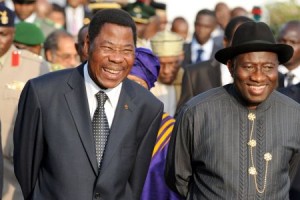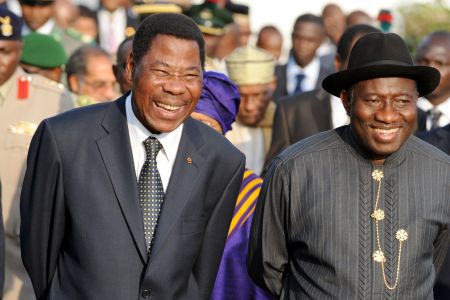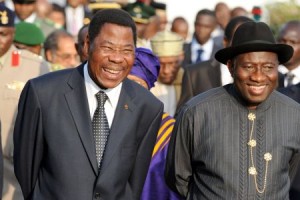Why Africa Lacks Laurel-Winning Leaders
Articles/Opinion Sunday, October 27th, 2013
By Omozuwa Gabriel Osamwonyi
The unclaimed Mo Ibrahim Prize for Advancement in African Leadership tacitly says Africa’s leadership crisis remains unabated. Since the yearly prize which is awarded by the London-based Mo Ibrahim Foundation to former African heads of state was instituted in 2007, only three winners have emerged. The prize is awarded to those whose policies and services enhanced peoples’ quality of life, fostered development in the areas of education, health and security. To be eligible, such leaders must have credibly transferred power in consonance with democratic tenets to their successors. There is no shortage of opinion about why the prize for the fourth time in five years has not been won.

- President Boni Yay (Left) i, African Union Chairperson and President of Benin Republic and his Nigeria’s counterpart, President Goodluck Jonathan
Some Afro-optimistic pundits who think Africa’s problem is her image say this development is a public relations nightmare. They are clamouring for a downward review of its eligibility criteria. For me, this call is ill-advised. It is a subtle campaign for the celebration of mediocrity. If heeded, it will defeat the essence of the prize, which seeks to rejuvenate Africa’s inept leadership by popularising principles of goal-directed leadership.
Let me give a worm’s-eye view of why the British-Sudanese mobile communications tycoon and philanthropic billionaire, Mo Ibrahim’s initial prize of US$5 million and subsequent $200,000 annual payment to winners seems elusive.
It is alleged that a former ruler of Somalia, Mohammed Siad Barre, just before the collapse of his regime in 1991 exultantly said: “When I leave Somalia, I will leave behind buildings but not people,” “after me, chaos.” This after-me-chaos spirit appears to be widespread in Africa. Some African leaders reluctantly relinquish power and gloat over the failures of their successors. In fact, some out-of-office leaders create political climates that foil innovation, peace and progress. It is against this backdrop that the Mo Ibrahim prize is best appreciated. Since, it seeks to foster a culture of peaceful and credible power transfer.
Largely, Africa is no longer ruled by narrowed-minded tyrants whose mission is to turn the continent to a cemetery of misspent opportunities. Yet, the democratic credentials of some African leaders are questionable. As their sit-tight demeanour, makes no room for mentoring and succession planning. They forget the maxim: “In the leadership relay, it makes no difference how you run, if you drop the baton.” The 23-year rule of Zine Abidine ben-Ali of Tunisia and his fall at the wake of mass revolt portrays the danger of “sit-tight-ism.” Several African leaders are just realising that deploying Machiavellian intelligence for self-perpetuation in power is ultimately destructive.
In many parts of Africa, there is a strong link between money and power. Money begets power. Leadership positions are vendible. They go to the highest bidders. Political marketers determine who and who occupy key public offices. This discourages many highly competent, value-driven and legacy-building patriots from seeking public offices. This fairly explains why in recent history, Africa has become a case study of the tragedies of accidental leadership.
Tutelary leadership is common in Africa. Many African leaders are puppets in the hands of powerful godfathers. When leaders are tutees of ideologically deficient power-mongers, can they deliver the dividends of democracy? No. Kleptocracy will be the order of the day. National resources will be plundered to gratify private wants. Wherever aristocratic thieves rule, thieves gain, the people suffer.
Policymakers often say Africa’s long-term development is in jeopardy, because of resource gap. Available capital for investment is insufficient to guarantee sustainable development. Hence, a vital component of NEPAD’s strategic plan is the Capital Flow Initiative (CFI). This claim is not entirely apodictic. Particularly, against the backdrop that Africa has lost over US$1.8 trillion through illicit capital flight in four decades. The actual problem is not resource gap, but leadership ineptitude, poor management of resources, plus pervasive corruption.
Corruption is the bane of Africa’s underdevelopment. It has mutilated the essence of leadership, making good governance a mirage. Kleptocracy with a veneer of democracy prevails. It seems comparatively easier to teach pigs, principles of hygiene, than to teach some leaders about the merits of internalising the principles of accountability and transparency in governance. Is it surprising then that no one won the awards this year?
Again, the prize remains elusive, because, the dehumanising conditions poverty has subjected many Africans to have not awakened the slumbering imagination of insensate leaders. Over the years, African leaders have failed to create prosperity for the majority. Their socio-economic agendas make the rich richer and the poor poorer. Hence, 80.5% of Sub-Saharan Africans live on less than $2.50 (PPP) per day. The war on poverty is fought mainly in the soapbox. Education, which veritably extricates people from generational poverty trap, is largely ignored.
Poverty has beclouded the horizon of African youths with hopelessness. Hence, many muster suicidal mettle to cross the Sahara in search of better life. With prescient leadership, youth unemployment would have been a footnote in Africa’s history and not a present debilitating realty. As long as leaders do not create the enabling climate for the industrialisation of our economies, youth unemployment may make many African states frail. By the way, we need to expunge the patronising expression “our leaders of tomorrow” from Africa’s political idiolect, since our leaders are not deftly handling the existential threats confronting youths.
Africa will no longer be seen as a place of ineffective leaders, if many will take cognizance of the wise counsel of Harriet Tubman: “Leave no brother or sister behind the enemy line of poverty.” Every stratum of power in Africa will be superintended by skilled leaders when followership is not separated from leadership. Leadership laureates will no longer be a rarity in Africa when followership makes it impossible for the overclass to impose leaders on them.
Related Posts
Short URL: https://www.africanexaminer.com/?p=3814
























